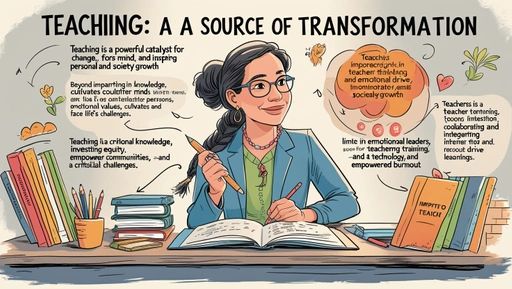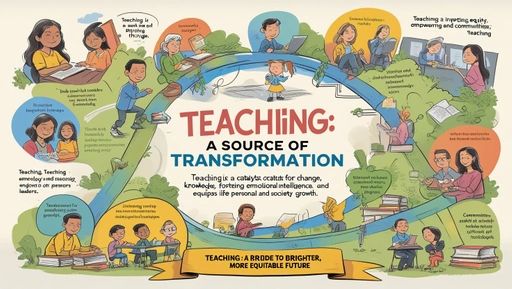Introduction
Teaching: A Source of Transformation, Teaching is a profound act that extends beyond the simple transfer of knowledge; it is a catalyst for transformation, shaping individuals, communities, and societies. By fostering intellectual growth, emotional intelligence, and ethical values, teaching empowers learners to navigate the complexities of life and contribute meaningfully to the world. This article explores how teaching serves as a source of transformation, impacting individuals and communities on multiple levels.
Teaching as a Personal Transformation Tool
Teaching has the power to transform individuals, not just academically but also holistically. A teacher’s influence often extends far beyond the classroom, instilling in students a sense of curiosity, critical thinking, and resilience.
- Fostering Intellectual Growth
Through innovative teaching methods, educators encourage students to question, analyze, and synthesize information. This intellectual stimulation promotes a growth mindset, enabling students to embrace challenges and view failure as an opportunity to learn. - Building Emotional Intelligence
Effective teaching nurtures emotional intelligence, helping students develop self-awareness, empathy, and social skills. By creating inclusive and supportive environments, teachers enable students to recognize and manage their emotions, fostering healthier interpersonal relationships. - Inspiring Lifelong Learning
Teachers often act as role models, igniting a passion for lifelong learning. They equip students with the tools to adapt to ever-changing circumstances, encouraging them to remain curious and innovative in their pursuits.
Teaching as a Societal Change Agent
Education is a cornerstone of societal progress, and teaching plays a pivotal role in driving this change. By shaping the values and skills of future generations, educators contribute to building a more equitable and sustainable world.
- Promoting Social Equity
Quality education serves as a powerful equalizer, bridging socio-economic gaps. Teachers, by providing equitable learning opportunities, help marginalized communities overcome systemic barriers, fostering inclusivity and social mobility. - Empowering Communities
Teachers instill civic values and social responsibility in students, encouraging active participation in community development. Educated individuals are more likely to engage in volunteerism, advocacy, and other transformative activities that benefit society. - Driving Economic Growth
Skilled educators prepare students for the workforce, equipping them with the knowledge and competencies required in modern economies. This, in turn, drives innovation, entrepreneurship, and economic development.

Challenges in Transformative Teaching
While teaching holds immense transformative potential, educators often face challenges that hinder their ability to create meaningful change.
- Lack of Resources
Many teachers operate in resource-constrained environments, limiting their ability to provide high-quality education. Access to technology, teaching materials, and professional development opportunities is essential for maximizing their impact. - Rigid Curricula
Standardized curricula often leave little room for creativity and individualized learning. Teachers need the autonomy to adapt their methods to meet the diverse needs of their students. - Emotional Burnout
The emotional demands of teaching can lead to burnout, affecting teachers’ ability to inspire and motivate their students. Support systems and self-care practices are vital for sustaining their well-being.
The Way Forward
To harness teaching as a transformative force, a concerted effort is needed to empower educators and reimagine educational systems.
- Investing in Teacher Training
Continuous professional development equips teachers with modern pedagogical skills and innovative approaches, enabling them to address diverse learning needs effectively. - Integrating Technology
Technology can enhance teaching by providing access to vast resources, enabling personalized learning, and fostering collaboration across geographies. - Encouraging Community Involvement
Collaboration between schools, parents, and communities strengthens the educational process, creating a supportive ecosystem for both teachers and students.
Conclusion
Teaching is much more than a profession; it is a transformative endeavor that shapes individuals and societies. By fostering intellectual, emotional, and social growth, teachers lay the foundation for a brighter and more equitable future. Recognizing and supporting the pivotal role of educators is essential for unlocking the full potential of teaching as a source of transformation.

9 thoughts on “Teaching: A Source of Transformation”
Comments are closed.